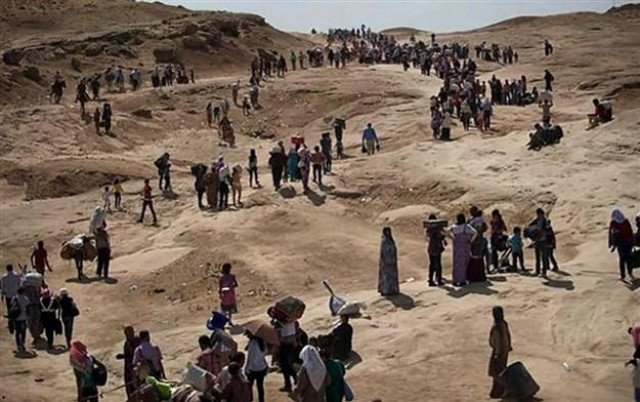After long trek to Armenia, Iraq's Yazidi families struggle to fit in
Armenian Yazidis believe their ethnic kin from Sinjar have been influenced by Islamic traditions of the Iraqi majority

Yazidis who could leave Sinjar, Iraq fled to the refugee camps of Lebanon, Jordan and elsewhere in the region. Around 50 families came to Armenia. PHOTO: AFP
He pauses for a moment, squints through the darkness towards a group of men drinking tea and begins to shout orders.
His eight sons swiftly form a production line from the barn through a field. Tires are passed methodically between them, rolled uphill and stacked in a pile at the top.
"We are preparing a fire to show unity with our brothers on Mount Sinjar," said Mouradyan, hauling the fuel onto his back.
"For the Yazidi people, light signifies solidarity. Maybe they will see the fire far away in the distance and know that we are thinking of them."
Mouradyan is one of around 35,000 Armenian Yazidis who have been settled in Armenia in southern Caucasus for more than a century. They have recently been joined by Yazidi families who have fled the so-called Islamic State’s offensive in northern Iraq.
Mass grave of 'Yazidi women executed by IS' found in Iraq
In August 2014, Islamic State militants began an assault on the Yazidi religious community's heartland in Sinjar, northern Iraq, home to around 400,000 Yazidis.
The insurgents systematically killed, captured and enslaved thousands of Yazidis, whose beliefs combine elements of several ancient Middle Eastern religions and are regarded by IS as infidels.
United Nations investigators estimate more than 5,000 Yazidis have been rounded up and slaughtered and some 7,000 women and girls forced into sex slavery.
Those who could fled to the refugee camps of Lebanon, Jordan and elsewhere in the region. Around 50 Yazidi families made the arduous journey by road to Armenia, seeking refuge among their fellow Yazidis in rural communities like the village of Araks.
“Too different”
But Armenian Yazidis believe that their ethnic kin from Sinjar have been influenced by the Islamic traditions of the Iraqi majority.
“Our way of life is too different from theirs. They are all Muslims now,” Mouradyan said. “We fear that they will bring instability and terror to our homes.”
Yazidi victim demands genocide trial for Islamic State leaders
In the village of Akna Lich, an hour's drive away, Ara, one of the new arrivals, has just returned home after a long day cultivating the land outside his home. He and his wife moved to the mostly Yazidi village late last year.
“We thought we would find peace here, but it's difficult,” said Ara, who did not want to give his full name.
“Here they think we are too different, that we are not real Yazidis anymore,” he said, removing his shoes and placing them neatly outside the door.
Kurdish forces retook areas north of Sinjar in December 2014, and the town itself in November 2015.
Christoph Bierwirth, representative for the UN refugee agency UNHCR in Armenia, said since Yazidi land in Sinjar has been retaken from IS many of the Iraqi Yazidis have returned to their homeland. Their decision was motivated in part by difficulties they faced integrating in Armenia, he said.
“They were welcomed in a small village with, on one hand an open approach from the local population and, on the other, with some misunderstandings about whether their prayers are Muslim or of another form,” Bierwirth told the Thomson Reuters Foundation at his office in the Armenian capital Yerevan.
“The lifestyle is very different for those in the Sinjar mountains and the Yazidi communities here,” he said.
New temple
Since January 2016 the Armenian government has contributed $100,000 to the UNHCR to support the resettlement of Yazidis from Sinjar, said Bierwirth.
Integration efforts continue to be a challenge for the authorities, balancing complaints from both communities, local officials said.
“This area is a mixed village: half Yazidi, half Armenian,” Mayor Gevork Misakian explained at his office in Akna Lich.
“It was decided that the arrivals from Sinjar should come here in order for them to stabilise. There have been some complications, but we continue to try our best to ensure there is harmony,” Misakian added.
In an effort to smooth integration, the government has started construction of the largest Yazidi temple outside Iraq to commemorate those killed at Sinjar and to honour Armenian Yazidis.
Canada parliament votes to take in Yazidi refugees
“In Armenia, our religion is accepted but in Iraq, they worship very differently,” said Sheikh Alehan as he prepared to conduct the funeral of a local Yazidi.
“No matter what happens, even if there is only one (Yazidi) left in the world, we will never change our religion. This is the difference with those from Sinjar,” he added.
The latest wave of persecution – described by the UN as a genocide – is another tragic phase in Yazidi history.
“The Yazidi nationality is under threat,” he said. “Genocide has become a part of our history, so we must do all we can to protect our identity. The temple is a symbol of that resilience.”
Bierwirth says that efforts such as this will help to ensure both existing and new members of the Yazidi community in Armenia can continue to practice their faith, and help the whole community to thrive, rather than to seek new lives elsewhere.
“Given the limited size of the group and out-flux migration, the Yazidis don't have enough priests, which they require to follow a full-fledged spiritual life,” he said. “That is a factor for many Yazidis to look for opportunities outside Armenia.”
But for new arrivals like Ara, life has been a struggle.
“All we can hope for is to avoid any disputes, to keep our heads down and to continue working,” Ara says. “Only then will we really be safe.”



















COMMENTS
Comments are moderated and generally will be posted if they are on-topic and not abusive.
For more information, please see our Comments FAQ